Jeanette Grasselli Brown
Chemistry in the Lab
and with Glenn and her Hungarian RootsJeanette Gecsy was born in 1928 to Hungarian immigrant parents who first met in America. Her brother Robert was born 18 months after her. 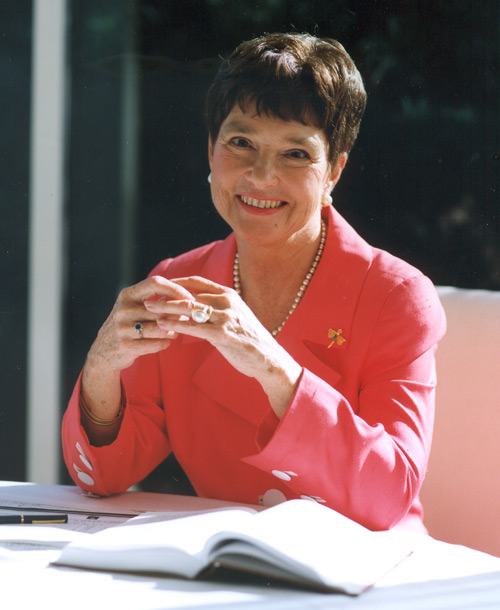
Like so many Hungarian immigrants, her parents worked at the National Malleable Steel Casting Company. "This is why Hungarians flocked to Cleveland because there was an industry here servicing the supply chain for the automobile and steel industry and other manufacturing industries. These were skilled or semi-skilled blue collar workers who had a trade. They were core making or tool and die makers... iron making." She explains that after the first Hungarians came to Cleveland and secured good jobs, they sent for friends and other family members and the city's Hungarian population grew. 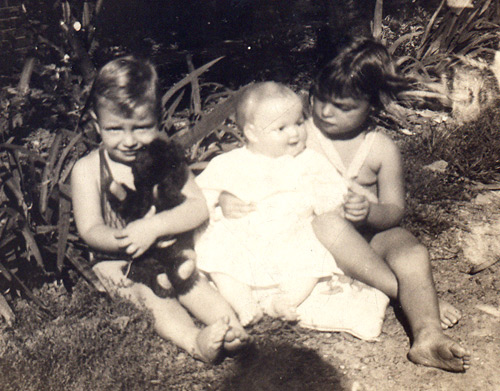
Jenny Gecsy at age 3 in 1930 with her brother Bob, age 1,
and a favorite toy
Jenny just recently started looking into her genealogy and tried to find the two cities her parents came from. She thought she found the right cities and took a trip there to look through cemeteries and records but couldn't find what she was looking for. Her mother came from near the Ukraine border; her father close to the Slovak border.
She travels back to Hungary at least once a year, partially because of her work with the Hungarian Development Panel here in Cleveland.
Jenny grew up in the Buckeye Road area, a very Hungarian neighborhood where "really Hungarian was the only language spoken. I mean that quite literally. The butcher shop was Hungarian, the movie theaters - everything."
She was baptized, Catholic, at St. Margaret of Hungary and made her first Holy Communion at St. Elizabeth, also a Hungarian parish.
There was a restaurant in the area called The Gypsy Cellar. "My mother had a beautiful singing voice and knew all the words to the old Hungarian songs. When she walked in they would yell for her to sing, and she always did." "In those days" Jenny explained "kids went everywhere with their parents. " So they all had a wonderful time. She remembers the great time they had as families at weddings with the children all sliding across the dance floors. "Today, children are seldom invited to the receptions."
Jenny acknowledges that these were the depression years, and they were actually very poor. "But, I don't remember being hungry, although my mother later said that my father did odd jobs - he washed windows and other things. He went to the woods and found mushrooms for us to eat. He just worked at whatever he had to to make ends meet."
Almost every family at that time had a family member living on a working farm outside of Cleveland and Jenny's family was no exception. You could usually get a chicken or an egg or two. "It was a time that I know now was very, very hard, but I grew up happy." She remembers growing up with many aunts and uncles - although she is not sure if they were really related, "They were all such good friends and we called everybody Aunt and Uncle."
They would all go on family vacations to Sandusky, where they would fish. The "aunts and uncles" came along as well. "People took care of each other and watched out for each other. People got along." Well, almost everyone got along. She remembers her father telling the story of an ongoing feud of sorts, between the Hungarians and the Italians because one area of Buckeye Road butted up to Little Italy which was a thriving, upcoming (and intense) neighborhood.
Jenny's dad played sandlot baseball and as a result she became a huge fan of baseball in general and the Cleveland Indians in particular.
Her mother was a marvelous cook "as so many of our ethnic mothers were. She made everything from scratch. So basically our family picture included family gatherings with wonderful food, all of the relatives, kids playing all the old games like kick the can - and of course baseball. I'll never forget choosing teams with the bat and how bad you would feel if you were the last one chosen." Jenny tested high on academic scores when it was time to go to school so she skipped the third grade. She attended Harvey Rice Elementary School. "Cleveland had an educational system then that was envied across the nation." 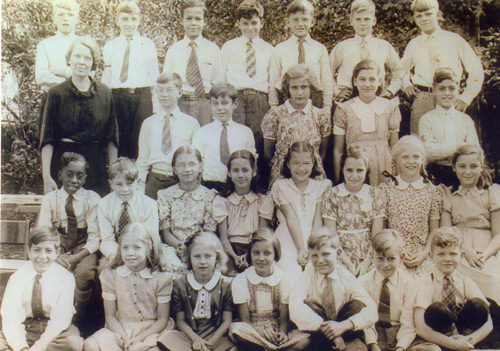
Jenny Gecsy and Harvey Rice Elementary School class in 1939 with teacher Miss Nelson
She took French starting in the fourth grade and advanced Math early on. She also learned to use a saw and her brother learned to cook and they both learned to sew. "This was a time when it was important to know those things."Her parents moved to 132nd and Buckeye and Jenny then attended Alexander Hamilton and finally John Adams High School. "There I had one of the best educations possible, with things like aeronautical engineering, physics in the 11th grade and chemistry in the 10th grade. " 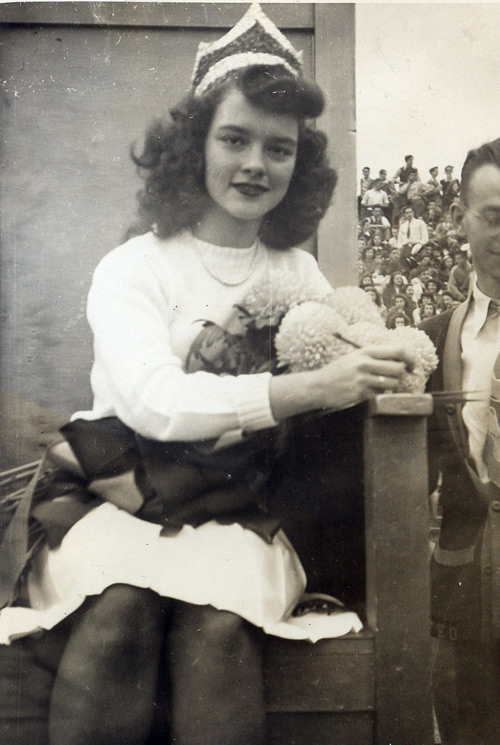
Jenny was John Adams HS 1945 Football Queen
There was never a question at the Gecsy household that Jenny and her brother would attend college. Although very intelligent themselves, both of her parents only had an eighth grade education and they wanted much more for their children. It was her chemistry teacher who put her on the path to her eventual career. Jenny's plans were to become an English teacher because "in those days you either became a teacher or a nurse and I loved English".
Her chemistry teacher suggested she major in chemistry and she asked "what would I do with that?" He pointed out that she could work in a laboratory and possibly invent something someday that would help a lot of people be healthier and happier. At this time Jenny was about 16 years old and "this was very attractive to me."
He also told Jenny that if she chose chemistry as a major he would get her a scholarship to Ohio University, which was his alma mater. "That's exactly how I got to Ohio U." Tuitions in those days were about $40.00 a semester, but it was still prohibitive and Jenny had expected to work her way through school. 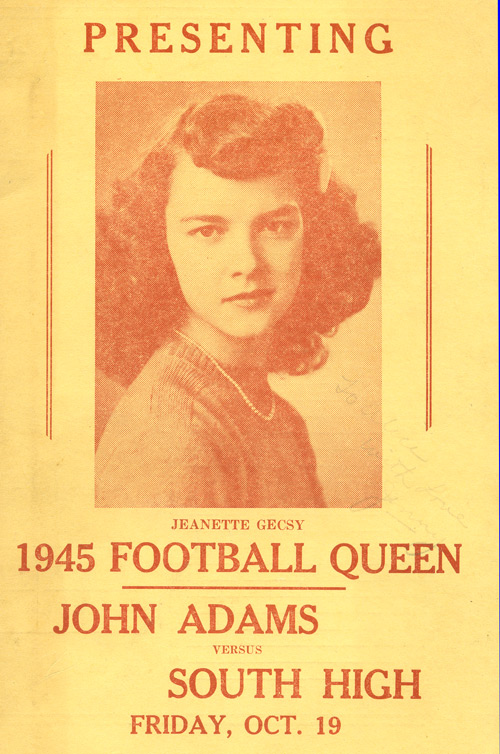
She graduated from High School in 1946 and just about that time her father decided to go into his own business. He was making cores for iron casting and got the idea that aluminum would be a much better material to work with because it was light weight and could be used in highly specialized applications with higher profit market. He opened a business in Elyria making sand cast aluminum parts, in the last year of the war.
Jenny says she was very fortunate in college. She had a job assisting in the chemistry department and one in the library as well. She assisted a professor of meteorology, a subject that had always intrigued Jenny. 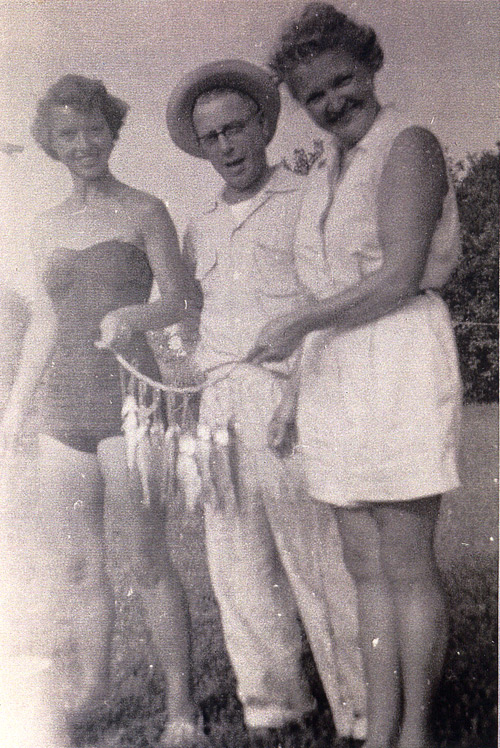
Jenny and her parents fishing in Sandusky
The war ended and her father's contracts ended. The foundry failed and they went bankrupt, which was a great shock to her family. "Especially for an ethnic family, a bankruptcy is a real blow."At the same time, her brother, Robert, was diagnosed with Hodgkin's disease. He had spent 2 years in the military and then went to Ohio University where he met his wife. 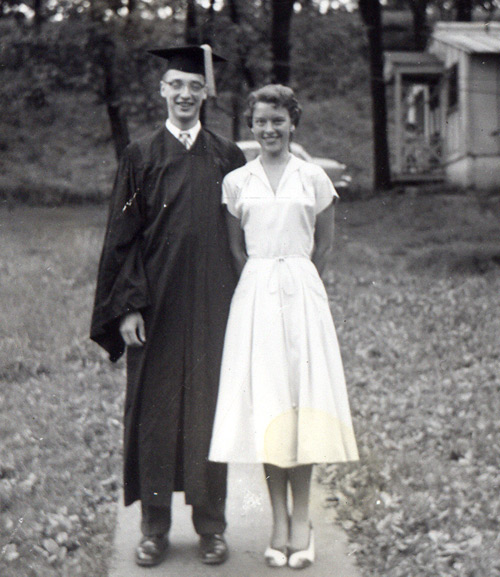
Bob Gecsy graduation with sister Jenny
He was on the path to receive a PhD in Physics at the University of Chicago, but a year and a half later, at only age 26, he died.
Once again the family was in deep shock. The combination of the bankruptcy and Robert's death was too much for her father, and her parents divorced. The divorce was very traumatic for Jenny who had no other siblings. 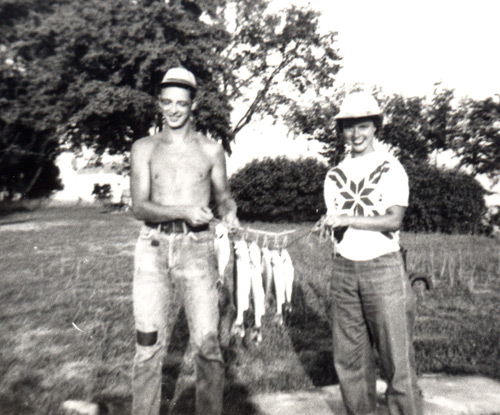
Jenny and her brother Bob
In 1950, Jenny graduated and was immediately offered a job at Alcoa in Pittsburgh because the professor she had been working with was in the aluminum business. Since Jenny had worked with her father at his foundry every summer she knew a lot about it. 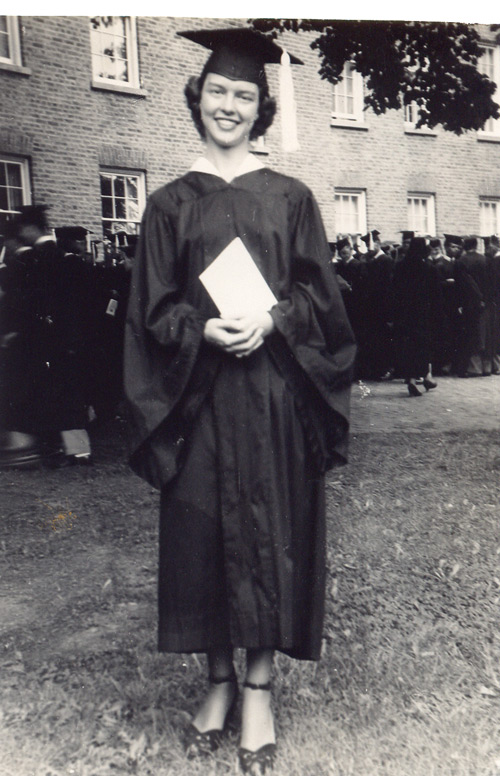
Jeanette Gecsy graduation from Ohio University in 1950
Standard Oil, in Cleveland, also offered her a job. "This was 1950 remember, just as my brother was diagnosed, so I wanted to be here in Cleveland close to family. I took the job with Standard Oil that led to a perfectly wonderful 38 year career."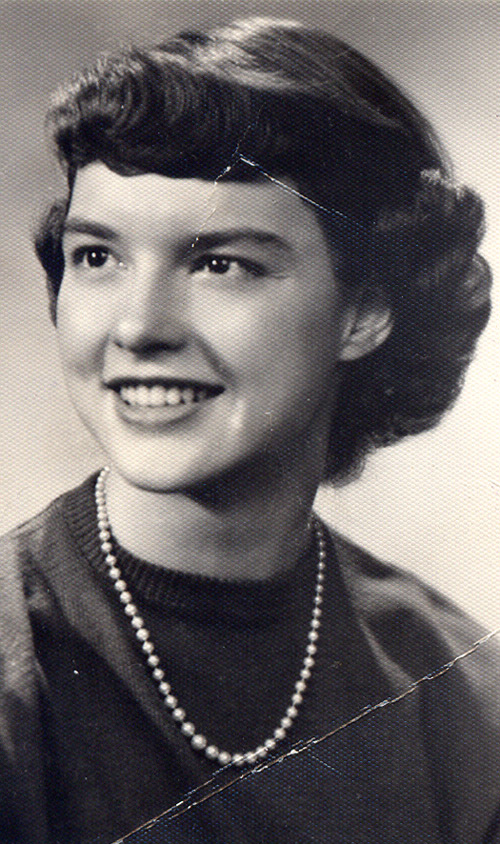
The war had recently ended. "The war, of course, spun off a lot of technology. Just like going to the moon spun off technology likes transistors and miniaturization and so forth. And one of the spin-offs from the use of radar during the war was an instrument called an Infrared Spectrometer. It was using the applications that had been developed during the war…. Industries began to realize there were some powerful industrial applications. Standard Oil, who was always at the forefront of science and research, decided they needed to obtain one of these instruments."
This was the time Jenny was staring at the lab and they tasked her with finding out everything she could about the instrument and what it could do. She says she was extremely fortunate to be there just at the right time because she formed her entire career on this instrument. "The instrument uses light in a non-destructive part of the spectrum - it uses infrared light and that's non-destructive."
Simply put, the instrument could be used in industry to determine material structure or the concentration of materials in other materials. You could analyze, for example, what Shell was putting in their fuel that "they claimed put a tiger in your tank." 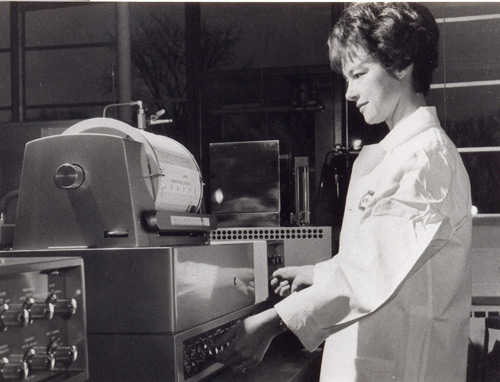
Jenny with the first infrared spectrometer at Sohio in 1951
As the field advanced Jenny was right there learning and growing with it. As a result she has had a tremendous career, including over ninety publications, nine books and talks around the world.She has traveled to over 120 countries and only recently have they been for vacation. "Like Russia and Japan. I was there for business purposes and more recently for vacation." 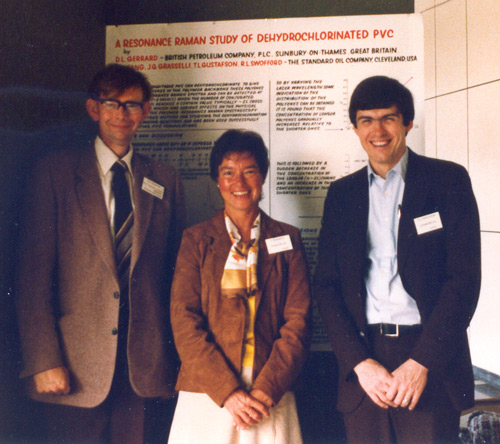
Jenny Brown at a Spectroscopy Conference in the UK in the 1970's with Dan Gerrard of BP and Terry Gustafson of Sohio
Women in business, never mind science, were virtually unheard of at the time she started at Standard Oil. She acknowledges that her work was groundbreaking both from a scientific point of view and as it applies to women. But, she says she was unaware of the social implications at the time. "I also must point out that we had a research director at SOHIO, Dr. Everett Hughes… was incredible and so far ahead of his time. We were located right on the campus of Case Western Reserve University. He was working with the professors and they would realize that now and then there would be a very bright young woman in the Chemistry Labs. He decided this was a wonderful source for him." 
Jenny Brown and David Shimotakhas at 2010's Dancing with Celebrities
Jenny used to give a talk called "Must Women Try Harder?" and she doesn't hesitate in stating that, yes, women must try harder. Late in the 1950's the SOHIO research lab consisted of about 20% women, most of whom came from Case Western Reserve, Ursuline or Notre Dame. "SOHIO was very much ahead of their time in recognizing women's strengths."
.jpg)
Olga Dorchak and Jenny Brown.
Olga is a friend from John Adams HS
Jenny moved up the management ladder very quickly, and being a woman herself she was very sensitive to the issues of women in business and science. When she became manager of the department she was able to put in place part time work for women and a policy for assisting with child care facilities. She also tried very hard to equalize pay. "I never quite got there, but we got close."
The Standard Oil research Lab had approximately 70 employees in 1952. The lab had grown so large as a result of a major invention that, although not Jenny's idea, she was very involved with. "This was exactly what my High School Chemistry teacher encouraged me to think about - someday maybe I could do something that would help people and make them happier. This invention was doing that…, it was a method that would take a molecule which is worth nothing in crude oil - something that they just flare off and burn in the refinery - and turn it into a valuable chemical. "They were successful in creating that chemical. In fact, when they realized they were successful the supervisor set off a rocket on the front grass and the company went on to make billions of dollars. The Lab had a very congenial atmosphere with employees often socializing together.
Jenny became very well known in her field. She was president of the National Society for the entire United States, Chair of the International Union which allowed her to travel all over the world. 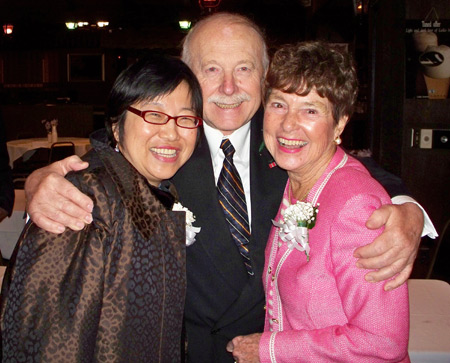
Margaret Wong, August Pust and Jenny Brown
It was during this time that a young Glenn Brown started working there as a chemical engineer. He was newly married. In 1957, Jenny married a co-worker at the lab, Dr. Robert Grasselli, from Slovenia. Dr. Grasselli and Jenny often went out socially with Glenn and his wife. They were all great friends. "Very early on Glenn was identified as very high potential and taken downtown to start on his career as senior vice president". She remembers it as a very exciting time at the laboratory and many of the people she worked with are still her very close friends today.
As time went on, Glenn's wife died of breast cancer. He was a bachelor for fifteen years. Jenny and Dr. Grasselli grew apart and eventually divorced. Glenn and Jenny had been friends for so long, and to the surprise of none of the friends or co-workers, they married. Glenn had two children, Robin and Eric. Glenn and Jenny now have three grandchildren. 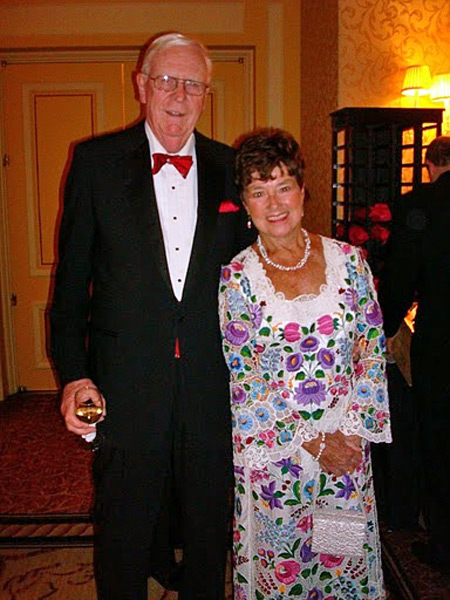
Glenn and Jenny Brown at the 2010 Paprika Ball
"He is a wonderful man and the most appreciative husband in the world. After having been a bachelor and he had two children he was raising… senior vice president… that's all very demanding."To this day, Glenn brings her roses every single week. "He loves the way I cook, and he is still amazed that I launder his clothes and his socks match." In 1986 Standard Oil was purchased by BP and Glenn took the buy-out package. "It was a very attractive package… "Jenny decided against it because she wanted to help with the merge of the SOHIO research lab and the BP lab. She finally retired three years later in January 1989. Glenn went directly to Case Western Reserve to become Dean of the Colleges, to merge the two colleges. He did that so well, that they no longer needed a Dean of Colleges so he became Vice Provost of Research. He was then appointed by Governor Voinovich to be the First Energy Advisor. Governor Taft kept him on. After that he became President of the Generation Foundation - so retirement may not be the right word to describe his post-BP days.
Calling Jenny retired is equally a misnomer. Beginning with her retirement in 1989 and continuing through 1995 she served as Distinguished Visiting Professor and Director, Research Enhancement at Ohio University. Governor Voinovich appointed her to the Ohio Board of Regents in 1995, the coordinating body for all higher education in the State of Ohio. Governor Taft reappointed her to the position. In 1999 she was named Vice Chair of the Governor's Commission on Teacher Success in 2002. 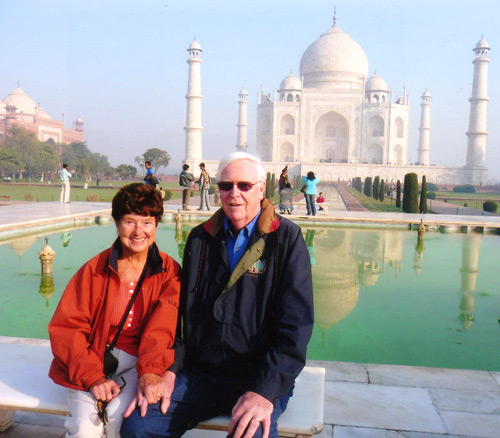
Jenny and Glenn Brown at the Taj Mahal in 2008
She has become very active in her community. She serves on the Board of many non-profit organizations such as Holden Arboretum, The Musical Arts Association, Cleveland Orchestra and, Cleveland scholarship programs. She is a past chairwoman on WVIZ/WCPN Idea Stream broadcasting, Chairwoman of the Great Lakes Science Center, board member at the Cleveland Clinic Foundation, Society for Science and the Public, Cleveland Hungarian Developmental Panel, Phi Beta Kappa and many, many more. Jenny holds thirteen honorary doctoral degrees, including one from the University of Pecs in Hungary. She is also a patent holder (vibrational spectroscopy). The American Chemical Society named her the Most Outstanding Woman Chemist in the country. 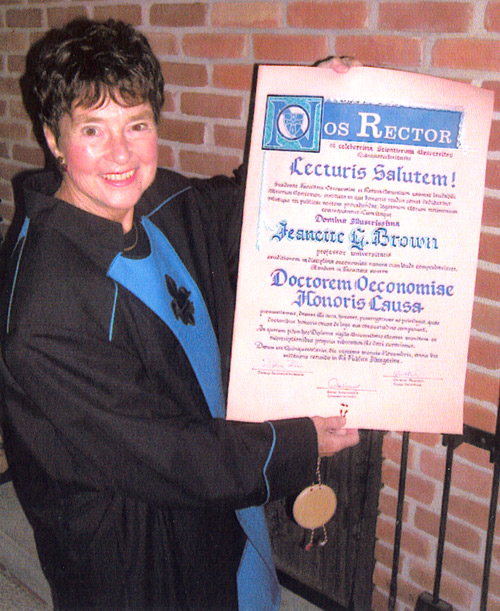
Jenny Brown with degree from the University of Pecs
in Hungary in 2002
Jenny was the first woman inducted into the Ohio Science and Technology Hall of Fame. She has also been inducted into the Ohio Women's Hall of Fame as well as being an inaugural member of the Cleveland International Hall of Fame. 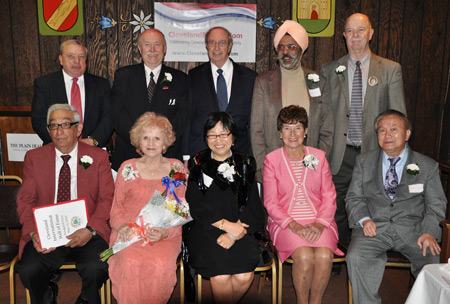
Cleveland International Hall of Fame induction 2010
(back row) Bob Haas, August Pust, Albert Ratner, Paramjit Singh
and Tom McCauley
(front row) Paul Sciria, Irene Morrow, Margaret Wong, Jenny Brown
and Dr. Dieu Thuc Do
In 2002 she received the National Ellis Island Medal of Honor and in 2004 she was selected to be included in the book "Ohio 200 years, 200 Women: Ohio's First and Finest."There is no end to the accolades, honors and awards Jenny has earned. 
KSU president Carol Cartwright with Glenn and Jenny Brown
at Kent State University in 2000
Jenny could have written her own ticket almost anywhere in the world, but she chose to stay here in Cleveland. Her first reason was family. She wanted to stay close and be part of their daily lives. It was also because she loved her job. "I would tell young people how much I looked forward to going to work every day and I would tell them if your job doesn't give you that kind of satisfaction, find something else. You're going to do this for a very long time."
Another part of her decision to stay is her love for the area she has always called home. She is a strong believer of Regionalism and a positive future for the City of Cleveland. She sees Cleveland's future in the hands of young people, who, she says, we must cultivate and help rise up now.
"There is still a huge stereotype for women… every young woman is always looking for mentors. I had mentors all of my life. [If we could] get to young women early we could mentor them and show them that science and technology hold wonderful careers. ...It is very important for women to see other women achieving so they know it could happen for them." "You get to love chemistry by doing chemistry. It is very much hands on. The same with Math and Science." Understanding this, she says, will help encourage young people, especially young women, to go into the sciences. According to Brown, this country "excels in technology, health care, bio-technology, micro-processing" and we need to develop our young people to participate in these areas. .jpg)
Jenny Brown speaking at the
Cleveland International Hall of Fame inductions
She is also a great believer in participation - it is not enough to complain or to except less than the best. "It is inexcusable. That's why charters [schools] are so successful. They tell students you can do this so you will do this and there are no excuses. And it happens."
The Hungarian community holds a very special place in her heart. During her long career she was focused mainly on business and had little time for her Hungarian heritage, although "I never lost sight of it". 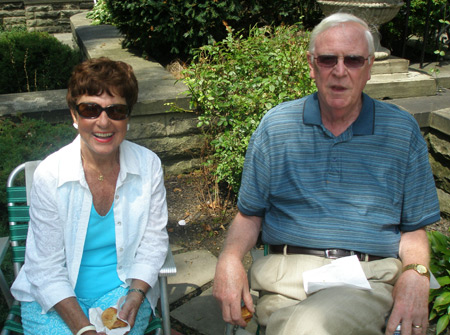
Jenny and Glenn Brown in the Hungarian Cultural Garden
for a Franz Liszt concert
After her retirement she became very involved with The Hungarian Heritage Museum at the Galleria. She is active on The Hungarian Developmental Panel helping to promote business opportunities between Cleveland and Hungary. She is one of the Hungarian Ambassadors to ClevelandPeople.Com.
Jenny is "steeped in custom". When she got married, Glenn noted that he had never seen anyone so involved in traditions from what you eat on Christmas Eve to what you wear or where you go. "It was wonderful and I keep those customs and Glenn now loves them." On Easter the boys would try to sprinkle girls' heads with water if they were interested in them. "There was a lot of merriment because the girls would duck and pretend they didn't want to be sprinkled, but of course they did."
So many traditions. Coloring Easter eggs, taking the baskets to the Church to be blessed. At Christmas the tree being decorated on Christmas Eve so that when the children woke up in the morning they were greeted by the beautiful tree and all of Santa's presents. She recalls a Christmas when she was about 6, her brother was 4 when she woke up in the middle of the night and thought it was Christmas morning. She woke her brother to go downstairs with her - and the tree was not decorated and there were no presents. She was sure they had been so bad that year that Santa wasn't going to come, when in reality her parents were still at Midnight Mass and hadn't relieved the babysitter yet.
She is not easily aggravated but people who do not make an effort to obtain information and facts before they pontificate on a subject will anger her. She will then do her best to provide the information they need to make an intelligent decision. "At least if I disagree with them then it will be based on facts."
Why does Jenny Brown do what she does? "I do it because I really and truly care. It is not for the fame or the recognition. There is always the question about philanthropy 'should you put your name out there?' and part of the reason [Glenn and ] I have chosen to do so is because I want people to think about how important that is, If someone who comes from my background with no family money, no inheritance - everything I have I have earned and same with Glenn. So if we give generously, I feel other people might be more inclined to join in and give generously. That's what runs America. Philanthropy is so important to our health care, our education, and our religious organizations." 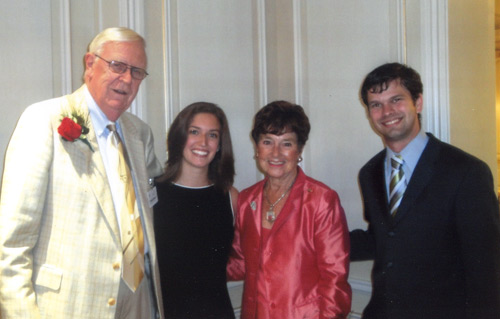
Glenn and Jenny Brown at the 2010 Ohio University Foundation WIP Award with Cutler Scholars Emily Grannis and Will Wemer
There are some aspects of our culture determined to "dumb down" our population, and sadly, mainly our women. It is a breath of fresh air and a hopeful future to listen to Jenny Brown speak and realize how her brains and her work ethic brought her to where she is today.
No one would have dared tell Jenny Brown she wasn't good enough or that she couldn't do something. She would have laughed in their face. She found her passion and she pursued it relentlessly. She has set the bar high for men and women both and is more than willing to help anyone reach and even surpass it. .jpg)
Jeannette Grasselli Brown is a role model for all of us. She shows young people what is possible if they really want something and she is an example to others in showing them how to share their knowledge and gifts to make everyone the best they can be.
Profiled by Debbie Hanson - September 2010
Top of Page
Back to Profiles of Cleveland Seniors
Back to Cleveland Hungarians
|